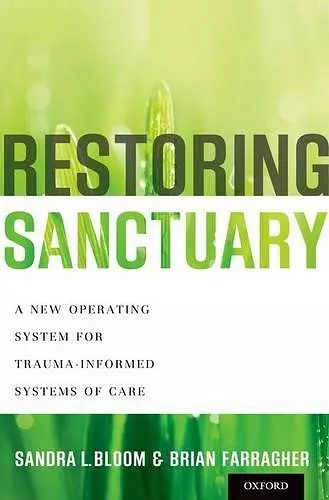Restoring Sanctuary
A New Operating System for Trauma-Informed Systems of Care
Sandra L Bloom author Brian Farragher author
Format:Hardback
Publisher:Oxford University Press Inc
Published:14th Feb '13
Currently unavailable, and unfortunately no date known when it will be back

This is the third in a trilogy of books that chronicle the revolutionary changes in our mental health and human service delivery systems that have conspired to disempower staff and hinder client recovery. Creating Sanctuary documented the evolution of The Sanctuary Model therapeutic approach as an antidote to the personal and social trauma that clients bring to child welfare agencies, psychiatric hospitals, and residential facilities. Destroying Sanctuary details the destructive role of organizational trauma in the nation's systems of care. Restoring Sanctuary is a user-friendly manual for organizational change that addresses the deep roots of toxic stress and illustrates how to transform a dysfunctional human service system into a safe, secure, trauma-informed environment. At its heart, The Sanctuary Model represents an organizational value system that is committed to seven principles, which serve as anchors for decision making at all levels: non-violence, emotional intelligence, social learning, democracy, open communication, social responsibility, and growth and change. The Sanctuary Model is not a clinical intervention; rather, it is a method for creating an organizational culture that can more effectively provide a cohesive context within which healing from psychological and socially derived forms of traumatic experience can be addressed. Chapters are organized around the seven Sanctuary commitments, providing step-by-step, realistic guidance on creating and sustaining fundamental change. "Restoring Sanctuary" is a roadmap to recovery for our nation's systems of care. It explores the notion that organizations are living systems themselves and as such they manifest various degrees of health and dysfunction, analogous to those of individuals. Becoming a truly trauma-informed system therefore requires a process of reconstitution within helping organizations, top to bottom. A system cannot be truly trauma-informed unless the system can create and sustain a process of understanding itself.
'Dr. Bloom, again, offers a unique perspective, well articulated and critically honest about the work necessary to effect the lasting change required for supporting a trauma-informed system of care. She does not minimize the challenges and is careful to describe all dimensions of the effort required to make it an ultimate success. Her time intensive, top down/bottom up, all inclusive exploration may initially be off-putting for some, but for those with foresight - they will quickly grasp the long term benefits and the "profit" that will result from such an endeavor. If the remaining chapters provide similar guidance as found in Chapter 2, the resulting book will become an invaluable resource on organizational development and change and the "trilogy" could easily be mainstay texts of any curriculum within any organizational psychology department.'--- Sandra Vasko, Mental Health Administrator for Operations, Philadelphia Office of Mental Health, Department of Behavioral Health 'In summary, I recommend the book for publication. It completes the project that the author began with her previous two books, promising a practical approach to dealing with organizational stress that is innovative, unique, and a welcome addition to the literature. It has broad appeal to an academic and practice audience. I would happily add the book to my library and I would also use it for several of the courses I teach on agency-based social work practice and mental health in Penn's MSW program.'-Linda Hartocollis, Associate Dean for Student Affairs and Director of the Clinical Doctorate in Social Work (DSW) Program at the School of Social Policy & Practice, University of Pennsylvania 'This is an exceptional, creative volume that integrates a trauma informed model with advanced thinking in organizational development and management. As a road map for change, it is both timely and challenging. Written in an accessible style, the author has woven together from diverse fields an impressive tapestry of cutting edge knowledge that can be readily applied in the mental health, education, justice, and child welfare field. It is obvious that this model has been honed from experience and extensively reviewed for application. This volume is a unique contribution and definitely should be published.'-Anita Lightburn, Professor and Director, Beck Institute for Religion and Poverty, Fordham University School of Social Service
ISBN: 9780199796366
Dimensions: 160mm x 226mm x 48mm
Weight: 612g
336 pages